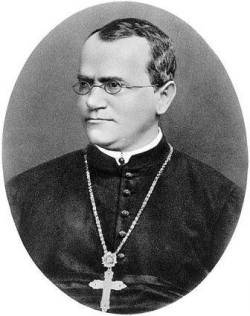Gregor Mendel

Picture by Hugo Iltis
- Born
- 20 July 1822
- Died
- 6 January 1884 (age 61)
Gregor Mendel established the laws of inheritance which to this day underpin the field of genetics.
Mendel’s parents were farmers; it is likely that their limited finances led to Mendel joining an Abbey in Brunn as an Augustinian monk. Here, he studied and also taught children at a local school. Later, he went to the University of Vienna to study sciences (physics, chemistry and zoology) before returning to Brunn.
In a garden at the monastery Mendel conducted his famous cross breeding experiments. People had known for a long time that by breeding individuals with desirable characteristics, it was possible to get those characteristics in the offspring (selective breeding), but they wrongly thought that the offspring were just a blend of the parents’ characteristics.
Mendel conducted many cross breeding experiments with peas over several years and, even though he did not know about DNA, was able to accurately describe how certain characteristics (such as pea colour) were inherited. He described how genes (or ‘factors’ as he called them) were passed down from parent to offspring. He showed that it was not simply a blending of characteristics that occurred, but that inheritance of characteristics could be predicted mathematically. It was Mendel who coined the terms dominant and recessive. His rules are still used today for predicting inheritance of genetic diseases.
My scientific studies have afforded me great gratification; and I am convinced that it will not be long before the whole world acknowledges the results of my work.
While his work was published and presented at the time (1866), it did not get the recognition it deserved. Mendel took over as abbot at Brunn in 1868. This would have taken up much of his time and greatly limited his ability to continue with his research. He had thought his work would soon be recognised, but it was not until 1900, 16 years after his death, that his work was brought back to public attention by other researchers working in the same field.
Mendel’s years of research and the insightful conclusions he drew from his data, have given us the foundations for a key field of biology. This is why Mendel is regarded as the father of modern genetics.
This profile was written by a Biology: Changing the World volunteer.



